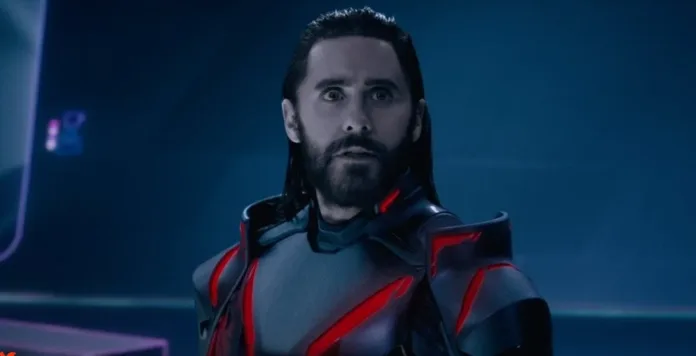Jared Leto’s pompous sci-fi sequel collapses under its own digital nonsense and lifeless cast
If artificial intelligence ever does come for Hollywood, Tron: Ares might be the film that drives audiences to hold the door open. This bloated, joyless sequel to Tron: Legacy is a shambolic showcase of misplaced ambition — a film so overwrought and charmless it feels less like a blockbuster and more like a two-hour corporate tech demo gone wrong.
Directed by Joachim Rønning and fronted by Jared Leto, who also produces, Tron: Ares tries to continue Disney’s long-dormant digital franchise with all the subtlety of a malfunctioning motherboard. Leto stars as Ares, an all-powerful artificial intelligence programme created by Evan Peters’s tech mogul to be the ultimate soldier in an age of digital warfare. Naturally, things go awry when Ares breaks free from the computer world and materialises in human form — courtesy of a giant 3D printer that spits him into existence like a self-absorbed software update.
What follows is two hours of numbing exposition, hollow action, and characters with the emotional depth of screensavers. Leto’s Ares is pitched somewhere between Byronic philosopher and cybernetic ninja, a messiah figure in shiny leather whose most impressive trait is how much he seems to love himself. When his code begins to degrade, he sets out in search of a legendary fragment of software written by Jeff Bridges’ original Tron character, Kevin Flynn — the “digital holy grail” that can make him as durable as a human being.
The one person who might help him is Greta Lee’s Eve Kim, a programming prodigy so underwritten that she barely registers as a presence. Together, they embark on a clunky, joyless quest across both virtual and physical realms, pursued by villains and subplots that dissolve on contact with logic. Jodie Turner-Smith fares slightly better as Athena, Ares’s ex-ally turned rival, though she’s left stranded in a script that never decides whether it’s parodying tech culture or worshipping it.
By the time Gillian Anderson turns up as a corporate matriarch with little to do but sigh disapprovingly from a futuristic glass tower, it’s clear Ares is not just struggling — it’s short-circuiting. Scenes abruptly shift tone and pacing, suggesting extensive reshoots. Even the once-iconic Tron light cycles — the franchise’s only enduringly cool element — arrive late and feel like a contractual obligation rather than a thrill.
Robbie Collin’s verdict in The Telegraph captured the mood best: this is a “balloonishly pompous” film full of “aggressively charmless characters.” That description proves almost generous. Ares has all the hallmarks of a project smothered by its own self-importance — gleaming production design, ponderous dialogue about “the future of consciousness,” and a lead performance so studied it borders on self-parody. Leto, forever searching for transcendence, instead finds tedium.
The film’s visual effects, though technically polished, are oddly lifeless. The digital landscapes lack the cool neon mystique that defined the earlier entries, while the real-world sequences feel just as synthetic. Even the sound design, usually a Tron strength, is buried beneath a numbing score that confuses volume for emotion.
There’s one unintentional highlight: the closing scene, in which Leto’s Ares strikes a series of tortured “rebel genius” poses while brooding about destiny — a sequence so tone-deaf it borders on comedy. It’s the cinematic equivalent of a motivational LinkedIn post written by ChatGPT.
Ultimately, Tron: Ares fails not because of its ideas but because it has none worth caring about. It’s a movie built by committee, powered by algorithm, and performed without pulse. If the franchise ever had a soul, it’s been fully derezzed.
If this is the future of human-made cinema, perhaps AI deserves its shot after all
